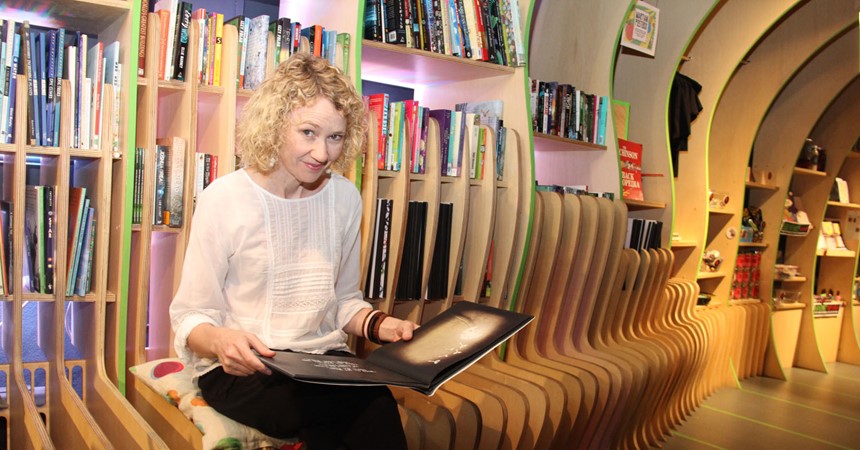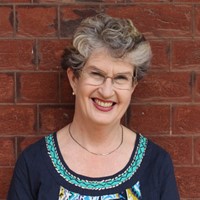You enter The Story Factory at Redfern through the portal of The Martian Embassy; “Only earth children and committed creative brains allowed past this point.” If you qualify, you enter an enticing world of flying saucer repair kits and birds’ nests, manual typewriters and weird alien stuff – and books, books and more books!
The Story Factory owes its origin to a renowned TED talk by novelist Dave Eggers (see below) about 826 Valencia, a writing centre for young people in San Francisco founded in 2002. Catherine recalls, “I thought it was fantastic − I sent it to my mate Tim and we started thinking about whether there was anything like this in Sydney. There wasn’t, so we started asking people what they thought. We went to San Francisco, adapted the model of 826 Valencia and brought it back here.”
Hence The Story Factory was born.
Since that time, the centre has operated according to its mission.
Every day, we set out to:
- Run innovative and fun creative writing programs, with expert teaching and one-on-one tutoring.
- Encourage young people to communicate ideas, giving them more confidence in their skills, themselves and each other.
- Create and sustain a vital contribution to the community, by respecting and giving voice to the stories around us.
The focus of a small number of staff and an enormous number of volunteers (1200 and counting) is young people from marginalised backgrounds: foster children, children of refugees, indigenous young people, children in institutional care.
“We find we get a lot of kids here who are not considered to be good at writing, and they don’t like writing. Then they come here and all of a sudden, it’s − oh, this is much more fun than I thought it was and it turns out that I’m a much better writer than I thought I was”, says Catherine.
She recalls her own classroom experience. “I always enjoyed writing and I had a couple of teachers who identified that as something I was good at and that made a big difference to me.
“I always read and I always wrote. I read indiscriminately. Not 'capital L' literature as a child - Trixie Belden, Nancy Drew, Enid Blyton….Mum said I had the annoying habit of reading street signs aloud!”
While Catherine acknowledges that the classroom can’t always allow the one-to-one process that brings optimum results, she is confident that every student has many stories to tell. “It’s not hard to get them to tell those stories, you just have to give them the freedom and it will come.
“There are three big things that make a difference. The first one is the volunteers. Normally a student would work ‘one on one’ or maybe in a group of two or three with a volunteer. Writing is hard, and there are lots of points where writers get stuck − you don’t know what to do and you’ve lost a bit of interest − but here is a volunteer who says, ‘I really like what you started here with this guy and I want to know what happens next.’ You have a conversation and the student continues the story. In a classroom, when they get stuck they often stop, because of course the teacher can’t talk individually to every child every time. The volunteer – and they range from retired journalists to uni students − is someone who’s really interested in their ideas and that’s such a positive, empowering thing.
“The second thing is that we provide this amazing space. The students are not being assessed and they’re given the freedom to write about things they’re interested in. It’s very hard to write about something you’re not interested in. Here they have that creative freedom.
“Finally, at the end of every program, whether it’s a two-hour workshop or every week for a term, we give the students back their finished piece of writing. All those black binders you see are students’ work. It’s something they can hold on to and be proud of.”
Indeed the Story Factory includes the Martian Embassy Library which stocks published student works as well as plenty of young adult fiction.
The programs are offered to class groups at school and to individuals after school, on Sundays and during holidays. There are programs for teachers and special projects involving film, radio, dramatic monologue, photography and community writing.
When I visited, there was a constant stream of would-be volunteers being interviewed by experienced volunteers.
Lenard Gadil, a student in the final semester of his Bachelor of Arts/Education degree, hopes to become a history teacher. His motivation to volunteer encapsulates the mission of the Story Factory. “What attracted me is the same thing that attracted me towards a career in education: a chance to make a positive impact on the community and inspire young people to learn, think and ultimately hope. It's a chance to be the person I needed when I was younger. Someone capable of inspiring others to realise that the world isn't what we are given but what we make of it…we have the power to write our own stories. It took me a long time to learn that.”
Catherine Keenan’s dream of promoting the joy of storytelling has led to opportunities for thousands of children. However, as she says, “The downside of running a creative writing centre is that I write a lot less than before!”
To encourage a young person in your life to write:
* Ask lots of questions.
* Listen to the story they are telling you now.
* Encourage them to write it down.
* Don’t worry too much about spelling and grammar.
* Remind them that all writers, especially the very good ones, edit – revise – rewrite. There can be a temptation to think that when the first draft is finished, it’s finished – and it’s not!
* Come back to the story..."I've been thinking about...tell me more...." The more you talk to the writer about the story, the better the story will be.
* Type the story, design a cover, present it to family and friends, honour it.
* Read to children, have books lying around, join and visit libraries, and share stories, oral and written.
* Talk in the home or classroom about the book you are reading.
* Driving presents an opportunity to create or refresh stories, all in your own Martian capsule!























































































